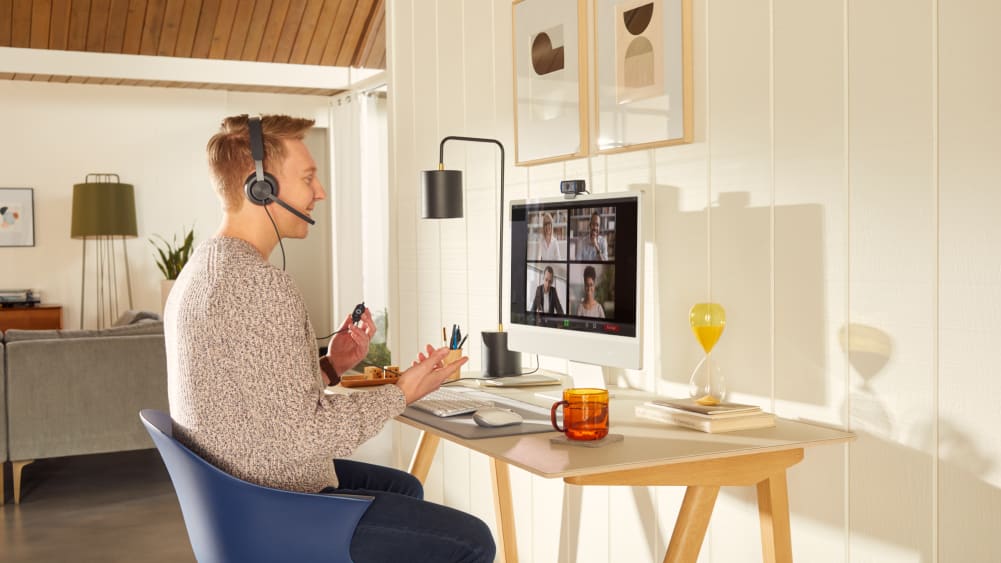Hybrid Meeting Etiquette: How to Master the Art of Productive Collaboration

While in-person meeting etiquette is well-established, the same can’t be said for hybrid meeting etiquette. You wouldn’t work on another project in an in-person meeting, so why do we think it’s ok to do it in a virtual meeting? It’s easy to see that meeting etiquette has suffered in the hybrid work model, but just because a meeting is conducted remotely, doesn't mean that the same level of professionalism and focus shouldn’t be maintained. So where do we begin with establishing meeting etiquette in a hybrid work model?
Set A Clear Agenda
Setting clear agendas is core to the productivity of any meeting, but it is especially important for hybrid meetings. How many times have you exited a Teams call where you feel like nothing was actually achieved given the amount of time you spent on the call? With some participants in the office and others working remotely, it can be challenging to keep everyone on the same page. Time is an invaluable resource that shouldn’t be wasted, and setting a clear agenda is a way to get the most from time spent in meetings. It doesn’t have to be over complicated or time consuming to set. Include the topic/s of the meeting, key goals, and any supporting documents and you’ll be covered.
Cameras On or Off?
The debate about cameras on or off during virtual meetings is another aspect of hybrid meeting etiquette that needs to be addressed. Video is a powerful way to maintain a human connection in a virtual meeting, so keeping your camera on when you can is a great way to show you’re engaged in the conversation. Starting a call with a grid of blank screens can feel cold and impersonal, creating the feeling of a one-way communication channel rather than an engaging meeting. Investing in quality video equipment for your team, both in the office and from home, facilitates seamless communication and collaboration, while also making hybrid meetings feel more human.
"Meeting facilitators should prioritise giving remote participants a voice by actively engaging and encouraging their participation. They should also encourage remote participants to turn on their cameras, showing that their presence is recognised and appreciated." — Sean Byrne, Head of Logitech B2B ANZ.
The use of avatars in the hybrid workplace is a newer aspect of hybrid meeting etiquette to be considered. Avatars for Microsoft Teams lets your users connect with presence in Teams without having to turn on their cameras. While avatars can help create a sense of presence and connection in virtual meetings, they can also be distracting. It is important to strike a balance between personal connection and productivity, so introducing a workplace policy on when the use of avatars is appropriate is something to consider. You can control whether avatars for Teams are available in your organisation and who can use them using policies.
Avoid Multi-Tasking
Whether it's doing other work or doom scrolling during hybrid meetings, we’ve all been a part of meetings where half of the participants have their minds and cursors elsewhere. Staying engaged in a hybrid meeting, particularly during busy periods, can be challenging. We suggest closing unnecessary tabs and applications and setting your notifications to do not disturb to immerse yourself in the topic at hand completely. Also, again by encouraging cameras on, involving all participants where possible and setting a clear agenda, you’re more likely to ensure productivity and reduce the team's multitasking.
Respecting Meeting Times
A concern that was raised in a recent roundtable hosted by Logitech ANZ was that there had been an influx of virtual meetings, with people setting appointments without first checking availabilities. It’s so important to consider other people's availabilities before scheduling a meeting and also to consider, does this person actually need to be in the meeting. Long and large meetings are costly and often considered a waste of time. Having shorter meetings with fewer participants can improve both individual and team performance. While meetings are important for collaboration, unnecessary meetings and poor practices can negatively impact engagement and productivity.
All in all, establishing proper hybrid meeting etiquette is crucial for maintaining professionalism and productivity in the remote work model, but it’s not something that will happen overnight. Lead by example, and the work culture will follow, and you’re employees will be able to get more from time spent in meetings.
YOU MAY ALSO BE INTERESTED IN
Browse Categories: